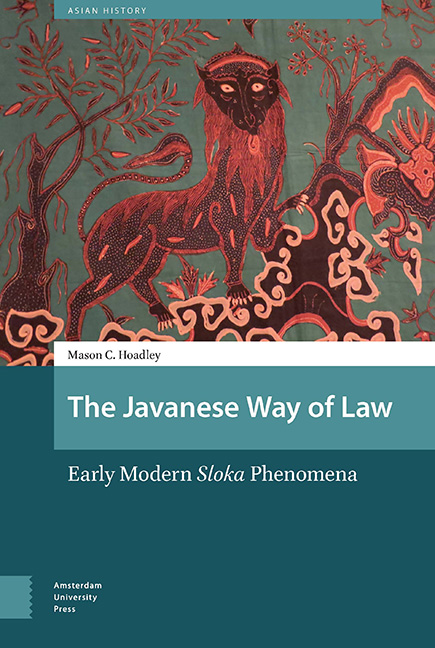Summary
For those unfamiliar with the sloka phenomena as the epitome of early modern Javanese law some explanation is in order. Three points seem particularly relevant, namely the role of the sloka phenomena within traditional Javanese law, their contribution to placing the law they serve in time and space, and their potential as a tool for investigating legal systems.
Characteristic of the Javanese law least influenced by European impositions is the apparent lack of binding precedent. None of the modest number of documented legal contests – textual, didactic, or actual – resolved by local tribunals refer to preceding decisions under similar circumstances or specific paragraphs from standard legal titles. At first glance, this seems to indicate that traditional Javanese law lacked a concept of precedent, one ensuring that legal decisions in some manner take note of prior manners of handling equivalent affairs. In early modern Java, wisdom of the past as a form of precedent has been distilled into what are termed the sloka phenomena, namely sloka proper, aksara, sinalokan, and prakara commonly communicated in vignettes. The sloka phenomena are not merely adjuncts of law in an ex post facto manner implied by translation of sloka/ saloka as ‘proverb’. They were much more. In tune with their Sanskrit predecessors, they constituted the essence of the law to be followed in specific instances.
A second characteristic touches on the historical context. Sloka phenomena not only dominate the period's legal texts but also serve to place them in time and space. Expectations of textual continuity from Old Javanese law as preserved in texts filtered through the scribes of Bali are belied by the results of the present study. Absence of the sloka phenomena in what is known of the legal titles of Old Java/Bali effectively distances them from the contents of the younger Javanese law texts analysed here. The latter embraces primarily eighteenth-century law prevailing in the Central Javanese kingdom of Mataram, one whose legal principles extended as far west as Priangan Regencies, Jakarta/Batavia, and even the kingdom of Banten on the island's western-most tip.
Even the incorporation of Islamic themes into legal texts of the period left the sloka phenomena unchanged.
- Type
- Chapter
- Information
- Javanese Way of LawEarly Modern Sloka Phenomena, pp. 13 - 18Publisher: Amsterdam University PressPrint publication year: 2019

